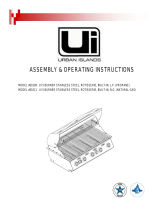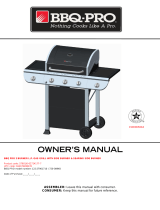
TABLE
OF
CONTENTS
PAGE#
SPECIF/CATIONS
FOR
BARBECUE
STRUCTURE
.......................................................................................
.......
.......... 5
CONNECTING
TO GAS
SOURCE
.................................................................................................................................
6
NATURAL
GAS
CONNECTIONS
............................................................................................................
.
.....
...
.
...........
.
6
PROPANE
GAS
CONNECTIONS
..............................................................................................................................
.......
6
OUTDOOR
NA TUR AL
GAS BBQ INSTALLATION
SPECIF/CATIONS
..................................................................................
7
OUTDOOR
PROPANE GAS
BBQ INSTALLATION
SPECIF/CATIONS
........................................................................
......
.
.
. 8
LP
GAS TANK
RETENTION.
.....................................................................................................................................................................
9
TRANSFORMER
.......................................................................................................................................................................................
10
INSPECTING
I
CLEANING
BURNERS
AND GAS VALVE
ORIFICES
...........................................................................................
11
BURNER
CLEANING
........................................................................................
.......
.................................
........
...............
............
.
..
......... 11
BURNER
SHUTTER
CLIP
INSPECTION
I
ADJUSTMENT..........................
..
...................................................................
11
BURNER
REPLACEMENT
INTO
INSERT...
............................
.
...............
............
......................
.
.
......
.................
............ 12
/GNITOR
/ELECTRODE
CHECK.
.............................................................................................................................
12
BURNER
OPERATION
CHECK
....................................................................................................................................
12
COOKING
COMPONENT
INST ALLA Tl ON
............................................................................................................................
14
LIGHTING
&
OPERATING
INSTRUCTIONS
.............................................................................................................................
15
LIGHTING
PROCEDURES
..............................................................................................................................................
. 15
OPERA
TING
PROCEDURE
................................................................................................
......
.
.
..............
..
..
.............. 16
COOKING
TEMPERA
TURES
......................................................................................................................................
.. 16
ROTISSERIE
COOKING
......................................................................................................................................................
17
LIGHTING
&
OPERA
TING
INSTRUCTIONS
..
...........
.
..
.........
..................
.
.
........
.
.
................. .........
..........
..
.
............
.
..
......
18
LIGHT
SYSTEM
.....................................................................................................................................................................
19
LIGHT BULB
REPLACEMENT.
.........................................................................................................................................
.
19
WIRING
DIAGRAM. ...
......
.......................
.
.
................
.
..
.........................
.......
.......................
...............
..............
..................
...........
............ 21
CLEANING &
MAINTENANCE
...........................................................................................................................................
22
TROUBLESHOOTING
...............................................................................................................................................................................
23
IF GRILL FAILS
TO OPERA
TE
PROPERLY
..............................................................................................................
.
.
....................
.
.
..
.
. 23
YELLOW
FLAME.
.....................................................................................................................................................................................
24
FLASH
BACK
............................................................................................................................................................................................
24
LOCATIONS OF
SERIAL
NUMBER.
................................................................................................................................................................
25
PARTS LIST
......................................................................................................................................................................
26
EXPLODED
ILLUSTRATION
.............................................................................................................................................
28
LIMITED
WARRANTY
........................................................................................................................................................
29
REGISTERING
YOUR
GRILL.
................................................................................................................................................................
29
• READ
THE
FOLLOWING
INSTRUCTIONS
CAREFULLY
AND BE SURE
YOUR
GRILL IS PROPERLY
INSTALLED,
ASSEMBLED
AND
CARED FOR.
FAILURE
TO FOLLOW
THESE
INSTRUCTIONS
MAY
RESULT IN SERIOUS
BODILY
INJURY
AND/OR PROPERTY
DAMAGE. IF
YOU
HAVE QUESTIONS
CONCERNING
ASSEMBLY
OR OPERATION,
CONSULT
YOUR
DEALER, GAS
APPLIANCE
SERVICE
REPRESENTATIVE
OR
YOUR
GAS COMPANY.
• NOTE TO
INSTALLER:
LEAVE
THESE
INSTRUCTIONS
WITH THE
CONSUMER
AFTER INSTALLATION.
• NOTE TO
THE
CONSUMER:
RETAIN
THESE INSTRUCTIONS
FOR
FUTURE
REFERENCE.
•
THIS
OUTDOOR
COOKING
GAS
APPLIANCE
IS NOT INTENDED TO
BE
INSTALLED IN
OR ON
RECREATIONAL
VEHICLES
AND/OR
BOATS.
*FOR
WARRANTY
PURPOSES,
PLEASE RECORD
YOUR
MODEL NUMBER,
SERIAL
NUMBER,
DATE OF
PURCHASE &
A COPY
OF YOUR
RECEIPT OR
INVOICE
IN THE
BACK
OF YOUR
MANUAL ON PAGE
29
.
•
CE: LP
NOMINAL HEAT
INPUT:
MAIN BURNER:
Qn=20.25kw.
BACK
BURNER: Qn=
4.05kw.
LP TOTAL HEAT
INPUT:
Qn
=
24.3kw(
176
8
.5
g/
h).
ELECTRICAL
SUPPLY: 240V,
50Hz, 60W.
LP GAS
CATERGORIES:
13+(28-30/37):
G30 Butane at
28-30mbar
and G31
Propane
at
37mbar.I3B/P(30):
G30
Butane
and G31
Propane at
30mbar. I3B/P(50):
G30 Butane
and G31 Propane
at
50mbar. NG
NOMINAL HEAT
INPUT:
MAIN
BURNER: Qn
=
19.25kw.
BACK
BURNER: Qn=3.85kw.
NG TOTAL
HEAT
INPUT: Qn
=
2
3
.
1
kw
(
1
6
81.
8
g/
h)
. NG
GAS
CATERGORIES:
I2H: G20 at
20mbar.I2E:
G20 at
20/25mbar. I2E+:
G20/25
at
20/25mbar.
Revision: 10/2015
(f:]IJ18

























